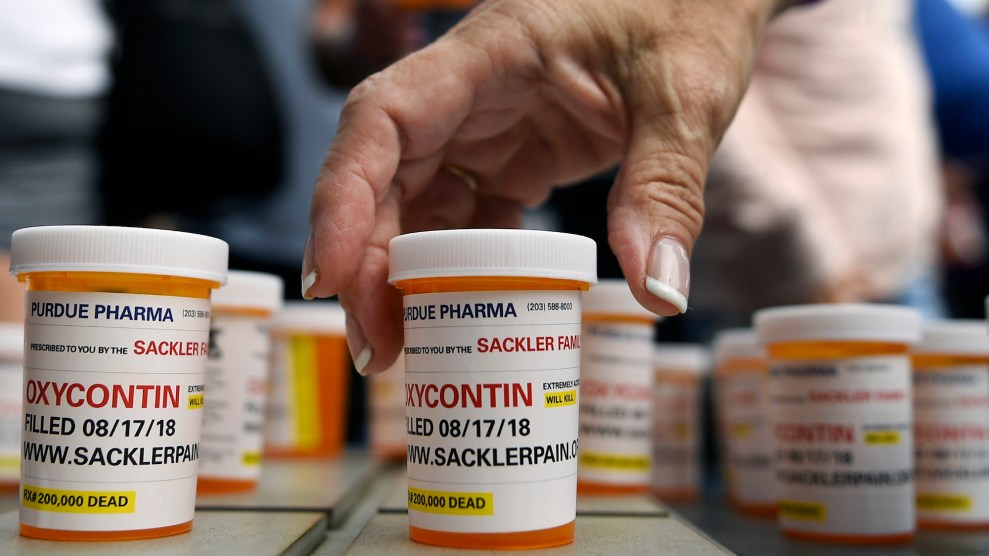
Family and friends who have lost loved ones to OxyContin and opioid overdoses leave pill bottles in protest outside Purdue Pharma LLP headquarters in Stamford, Conn. Jessica Hill/AP
This story was originally published by ProPublica.
Not content with billions of dollars in profits from the potent painkiller OxyContin, its maker explored expanding into an “attractive market” fueled by the drug’s popularity—treatment of opioid addiction, according to previously secret passages in a court document filed by the state of Massachusetts.
In internal correspondence beginning in 2014, Purdue Pharma executives discussed how the sale of opioids and the treatment of opioid addiction are “naturally linked” and that the company should expand across “the pain and addiction spectrum,” according to redacted sections of the lawsuit by the Massachusetts attorney general. A member of the billionaire Sackler family, which founded and controls the privately held company, joined in those discussions and urged staff in an email to give “immediate attention” to this business opportunity, the complaint alleges.
ProPublica reviewed the scores of redacted paragraphs in Massachusetts’ 274-page civil complaint against Purdue, eight Sackler family members, company directors and current and former executives, which alleges that they created the opioid epidemic through illegal deceit. These passages remain blacked out at the company’s request after the rest of the complaint was made public on Jan. 15. A Massachusetts Superior Court judge on Monday ordered that the entire document be released, but the judge gave Purdue until Friday to seek a further stay of the ruling.
The sections of the complaint already made public contend that the Sacklers pushed for higher doses of OxyContin, guided efforts to mislead doctors and the public about the drug’s addictive capacity, and blamed misuse on patients.
Citing extensive emails and internal company documents, the redacted sections allege that Purdue and the Sackler family went to extreme lengths to boost OxyContin sales and burnish the drug’s reputation in the face of increased regulation and growing public awareness of its addictive nature. Concerns about doctors improperly prescribing the drug, and patients becoming addicted, were swept aside in an aggressive effort to drive OxyContin sales ever higher, the complaint alleges.
Among the allegations: Purdue paid two executives convicted of fraudulently marketing OxyContin millions of dollars to assure their loyalty, concealed information about doctors suspected of inappropriately prescribing the opioid, and was advised by global consulting firm McKinsey & Co. on strategies to boost the drug’s sales and burnish its image, including how to “counter the emotional messages” of mothers whose children overdosed. Since 2007, the Sackler family has received more than $4 billion in payouts from Purdue, according to a redacted paragraph in the complaint.
“The payments were the motivation for the Sacklers’ misconduct,” the complaint says. “And the payments were deliberate decisions to benefit from deception in Massachusetts, at great cost to patients and families.”
In 1998, two years after OxyContin was launched, Dr. Richard Sackler, a son of Purdue co-founder Raymond Sackler, instructed executives in an email that its tablets were not merely “therapeutic” but also “enhance personal performance,” like Viagra. Fifteen years later, he complained in another email that a Google alert he set up for OxyContin news was giving him too much information about the drug’s dangers.
“Why are all the alerts about negatives and not one about the positives of OxyContin tablets?” he asked a company vice president. Staff immediately offered to replace Sackler’s alert with a service that supplied more flattering stories, according to the complaint.
The redacted paragraphs leave little doubt about the dominant role of the Sackler family in Purdue’s management. The five Purdue directors who are not Sacklers always voted with the family, according to the complaint. The family-controlled board approves everything from the number of sales staff to be hired to details of their bonus incentives, which have been tied to sales volume, the complaint says. In May 2017, when longtime employee Craig Landau was seeking to become Purdue’s chief executive, he wrote that the board acted as “de-facto CEO.” He was named CEO a few weeks later.
In a statement today in response to questions about the redacted material, the company said that Massachusetts “seeks to publicly vilify Purdue, its executives, employees and directors by taking out of context snippets from tens of millions of documents and grossly distorting their meaning. The complaint is riddled with demonstrably inaccurate allegations.”
Purdue acknowledged in the statement that it was considering acquiring the rights to sell drugs that combat addiction or reverse the effects of an overdose. It criticized the state for “casting in a negative light” the company’s exploration of a potential acquisition of an addiction treatment that was already on the market, “even though the company never actually made the acquisition.”
Purdue also pointed out that OxyContin is approved by the Food and Drug Administration. It said that most opioid overdoses “now result from heroin and illicit fentanyl.”
The Sackler family was once best known for its philanthropy. Its name is engraved on museums and university buildings across the world. A group of activists has called on organizations to stop accepting Sackler donations and for the family name to be stripped from some institutions. Aggressive marketing of OxyContin is blamed by some analysts for propelling the crisis that has resulted in 200,000 overdose deaths related to prescription opioids since 1999.
After its 1996 launch, OxyContin rapidly became a top seller. But reports of patients abusing the drug soon followed. OxyContin contained more pain relief medication than older drugs, and crushing and snorting it was a simple way to get high fast. In 2007, Purdue pleaded guilty to federal charges of understating the risk of addiction and agreed to pay $600 million in fines and penalties. Still, the company argued publicly that OxyContin has “done far more good than harm,” and it sought to place responsibility for the bad acts on “certain of its supervisors and employees.”
Privately, the complaint suggests, the Sacklers were concerned about alienating two executives, then-CEO Michael Friedman and then-legal counsel Howard Udell. Friedman and Udell each pleaded guilty in 2007 in U.S. District Court in Abingdon, Virginia, to a misdemeanor charge of misbranding OxyContin, as did a former executive. The board signed off on the three executives’ decisions to plead guilty. No member of the Sackler family pleaded guilty.
Purdue paid $5 million to Udell in November 2008, and up to $1 million in November 2009, the complaint states. In February 2008, the company paid $3 million to Friedman. The complaint doesn’t mention any payments to the former executive.
“The Sacklers spent millions to keep the loyalty of people who knew the truth,” the complaint alleges.
Udell died in 2013. A person answering a phone number listed to Friedman declined comment.
The plea deals did little to hinder OxyContin sales or the Sacklers’ hands-on management. At the direction of the board, Purdue repeatedly increased its sales force, which pushed doctors to prescribe higher opioid doses.
In 2008, the same year that Purdue paid Udell and Friedman, Richard Sackler advised other family members that it was important to select a new chief executive who was loyal to the family. “People who will shift their loyalties rapidly under stress and temptation can become a liability from the owners’ viewpoint,” he allegedly wrote. A defendant in the Massachusetts lawsuit, Richard Sackler served in a number of different positions at the company before being named president in 1999 and then co-chairman of the board in 2003.
The company did install five new, non-family board members in the wake of the federal investigation. But in hundreds of board votes, the new directors never opposed the family, according to the complaint. Although Purdue does not operate outside the U.S., board meetings took place at a castle in Ireland as well as in Bermuda, London, Portugal and Switzerland.
When sales results disappointed, Sackler family members didn’t hesitate to intervene. In late 2010, Purdue told the family that sales of the highest dose and most profitable opioids were lower than expected, according to the complaint. That meant an expected quarter-end payout to the family of $320 million was at risk of being reduced to $260 million and would have to be made in two installments in December instead of one in November.
That news prompted a sharp email question from Mortimer D.A. Sackler, whose late father, also named Mortimer, was a Purdue co-founder. “Why are you BOTH reducing the amount of the distribution and delaying it and splitting it in two?” he asked. “Just a few weeks ago you agreed to distribute the full 320 [million dollars] in November.” The complaint doesn’t say how much was ultimately paid.
From 2009 until at least 2014, McKinsey helped Purdue shape its message for selling OxyContin and overcoming concerns about addiction and overdoses, according to redacted passages. The consultant told Purdue in a slide presentation that it could increase prescriptions by convincing doctors that opioids provide “freedom” and “peace of mind” and give patients “the best possible chance to live a full and active life.”
Purdue staff, according to the complaint, told the Sacklers that McKinsey would study “patient pushback” to encourage hesitant doctors to prescribe opioids. In a meeting with Purdue executives, McKinsey planned how to “counter the emotional messages from mothers with teenagers that overdosed in [sic] OxyContin” by recruiting pain patients to talk about the need for the drugs.
In a 2013 report, McKinsey recommended directing sales representatives to focus on the most prolific opioid prescribers because that group writes “25 times as many OxyContin scripts” as less prolific prescribers. Because prescription rates rose in tandem with visits from sales reps to doctors, McKinsey recommended increasing each salesperson’s quota from 1,400 visits a year to closer to 1,700. McKinsey estimated that targeting the most frequent prescribers could boost OxyContin sales by hundreds of millions of dollars. The quotas rose, as did total visits, the complaint states. Purdue said it planned to decrease visits relating to opioid products, and any increase was due to promoting a laxative.
McKinsey also recommended Purdue fight back against efforts by a major pharmacy chain, the U.S. Drug Enforcement Agency and the U.S. Department of Justice to stop illegal opioid prescribing, the complaint states. These new rules were cutting into sales of the highest doses, which were also the most profitable, it says. The complaint doesn’t say if Purdue followed McKinsey’s recommendation. Purdue said the recommendations “actually relate to ensuring continued access to pain medicines for appropriate patients.”
A McKinsey spokesman declined comment.
In September 2014, Purdue embarked on a secret project to join an industry that was booming thanks in part to OxyContin abuse: addiction treatment medication. Code-named Project Tango, it involved Purdue executives and staff as well as Dr. Kathe Sackler, a daughter of the company co-founder Mortimer Sackler and a defendant in the Massachusetts lawsuit. She participated in phone calls and told staff that the project required their “immediate attention,” according to the complaint.
Internally, Purdue touted the growth of an industry that its aggressive marketing had done so much to foster.
“It is an attractive market,” the team working on the project wrote in a presentation. “Large unmet need for vulnerable, underserved and stigmatized patient population suffering from substance abuse, dependence and addiction.”
While OxyContin sales were declining, the internal team at Purdue touted the fact that the addiction treatment marketplace was expanding.
“Opioid addiction (other than heroin) has grown by ~20%” annually from 2000 to 2010, the company noted. Although Richard Sackler had blamed OxyContin abuse in an email on “reckless criminals,” the Purdue staff exploring the new business opportunity described in far more sympathetic terms the patients whom it now planned to treat.
“This can happen to any-one – from a 50 year old woman with chronic lower back pain to a 18 year old boy with a sports injury, from the very wealthy to the very poor,” it said.
Company documents recommended becoming an “end-to-end pain provider.” Initially, Purdue intended to sell one such medication, Suboxone, which is commonly retailed as a film that melts in the mouth. When Kathe Sackler asked staff members to look into reports that children might be swallowing the film, they reassured her. They responded, according to the complaint, that youngsters were overdosing on pills, but not the films, “which is a positive for Tango.”
In 2015, Purdue turned its attention to another potential product, the overdose reversing agent known as Narcan, calling it a “strategic fit.” Purdue executives discussed how its sales force could promote Narcan to the same doctors who prescribed the most opioids. Purdue said in the statement Wednesday that it decided against acquiring the rights to sell Suboxone and Narcan.
While those initiatives appear to have stalled or ended, Richard Sackler received a patent last year for a drug to treat addiction, according to the complaint. The patent application states that opioids are addictive and refers to people who suffer from substance use disorders as “junkies.”
Besides being a defendant in the Massachusetts case, Richard Sackler was deposed in a lawsuit against Purdue in Kentucky, which the company settled. It’s believed to be the only time a member of the family has been questioned under oath about OxyContin and its addictive properties. The Kentucky Court of Appeals has ordered the release of his deposition, in response to a motion by STAT, but Purdue is asking the state Supreme Court to review the ruling. Hundreds of other lawsuits filed by states, cities, counties and tribes against Purdue have been consolidated in a pending case in federal court in Ohio.
The Massachusetts complaint cites multiple incidents of Purdue allegedly sitting on information, sometimes for years, about doctors it had reason to believe were inappropriately prescribing OxyContin. In 2012, a Purdue employee appealed to the company’s head of sales to alert health insurers to data the company collected about doctors suspected of abusing or illegally prescribing OxyContin. The list of doctors was code-named Project Zero.
“At a basic level, it just seems like the right and ethical thing to do,” the employee wrote. “Doing so could help those companies identify those physicians that may be of a concern, not just with respect to our products, but also other” pain medications. “As a result, if it reduces abuse and diversion of opioids then it seems like something we should be doing.”
The idea was rejected and the employee left the company a month later, according to the complaint.














